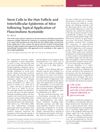February 2023 in “Research Square (Research Square)” Autologous Cellular Micrografts effectively treat hair loss with significant improvements and no dangerous side effects.
 25 citations,
September 2020 in “Molecules”
25 citations,
September 2020 in “Molecules” Quercitrin may help treat hair loss by promoting hair growth and improving cell health.
 20 citations,
September 2010 in “Cell Cycle”
20 citations,
September 2010 in “Cell Cycle” Mice can regenerate ear tissue without the p53 protein.
[object Object]  19 citations,
October 2017 in “The FASEB Journal”
19 citations,
October 2017 in “The FASEB Journal” Male hormones cause different growth in identical human hair follicles due to their unique epigenetic characteristics.
13 citations,
May 2021 in “FASEB bioAdvances” Plant-based products can improve hair and skin health without harmful side effects.
13 citations,
January 2018 in “International Journal of Trichology” Intralesional triamcinolone injections can effectively stop frontal fibrosing alopecia with minimal side effects.
 9 citations,
January 2016 in “PubMed”
9 citations,
January 2016 in “PubMed” Stem cell therapy could be a promising alternative for hair regrowth with fewer side effects.
 4 citations,
December 2021 in “Journal of Pharmacopuncture”
4 citations,
December 2021 in “Journal of Pharmacopuncture” Microneedle Treatment System is effective for hair growth and skin improvement with no serious side effects, but more research is needed.
3 citations,
September 2021 in “EClinicalMedicine” ALRV5XR effectively increases hair density in men with androgenetic alopecia without adverse effects.
 December 2024 in “Deleted Journal”
December 2024 in “Deleted Journal” New therapies show promise for wound healing, but more research is needed for safe, affordable options.
 September 2024 in “Journal of the European Academy of Dermatology and Venereology”
September 2024 in “Journal of the European Academy of Dermatology and Venereology” Baricitinib effectively reduces hair loss in severe alopecia areata with mild side effects.
 July 2023 in “Pharmacognosy Magazine”
July 2023 in “Pharmacognosy Magazine” Cerasus serrulata flower extracts have strong antibacterial and antioxidant effects and may help prevent hair loss.
 April 2017 in “Journal of Investigative Dermatology”
April 2017 in “Journal of Investigative Dermatology” Applying pseudoceramide improved skin and hair health.
January 2022 in “Aesthetic surgery journal” Extracellular vesicles may effectively treat hair loss with minimal side effects.
 270 citations,
March 2012 in “Dermatologic Surgery”
270 citations,
March 2012 in “Dermatologic Surgery” Platelet-rich plasma can potentially promote hair growth by stimulating cell growth and increasing certain proteins.
[object Object]  68 citations,
December 2014 in “Cell Biochemistry and Function”
68 citations,
December 2014 in “Cell Biochemistry and Function” Nuclear hormone receptors play a significant role in skin wound healing and could lead to better treatment methods.
 54 citations,
January 2016 in “Cell reports”
54 citations,
January 2016 in “Cell reports” Activating β-catenin in different skin stem cells causes various types of hair growth and skin tumors.
34 citations,
January 2022 in “Molecules/Molecules online/Molecules annual” Natural ingredients in cosmeceuticals are beneficial for skin and hair health with few side effects.
 25 citations,
March 2017 in “Steroids”
25 citations,
March 2017 in “Steroids” Allopregnanolone increases growth and changes gene activity in human brain cancer cells.
 24 citations,
January 2019 in “Science China Life Sciences”
24 citations,
January 2019 in “Science China Life Sciences” Chitosan/LiCl composite scaffolds help heal deep skin wounds better.
 24 citations,
July 2018 in “Stem cells”
24 citations,
July 2018 in “Stem cells” Runx1 controls fat-related genes important for normal and cancer cell growth, affecting skin and hair cell behavior.
 18 citations,
January 2018 in “International journal of medical sciences”
18 citations,
January 2018 in “International journal of medical sciences” Non-thermal plasma treatment makes mouse skin thicker and increases growth factors without harming the tissue.
 14 citations,
November 2018 in “Journal of Cosmetic Dermatology”
14 citations,
November 2018 in “Journal of Cosmetic Dermatology” PRP therapy safely improves hair growth in people with hair loss.
 8 citations,
April 2014 in “Anti-Cancer Drugs”
8 citations,
April 2014 in “Anti-Cancer Drugs” A hormone linked to collagen helps hair grow back in mice after chemotherapy, and may also prevent bone loss.
 7 citations,
December 2017 in “Anais da Academia Brasileira de Ciências”
7 citations,
December 2017 in “Anais da Academia Brasileira de Ciências” 6-Gingerol from ginger may slow down hair growth by affecting certain enzymes and growth factors.
3 citations,
August 2021 in “Journal of Cosmetic Dermatology” Non-ablative Er:YAG laser effectively treats hair loss with high patient satisfaction and no side effects.
 2 citations,
November 2007 in “Journal of Investigative Dermatology”
2 citations,
November 2007 in “Journal of Investigative Dermatology” Fluocinolone acetonide slows down hair follicle stem cells but speeds up skin cell growth in mice.
 1 citations,
January 2023 in “Journal of Clinical Medicine”
1 citations,
January 2023 in “Journal of Clinical Medicine” A new hair restoration technology was found to effectively increase hair thickness, density, and growth, while reducing hair loss and improving scalp health, with no side effects.
1 citations,
August 2019 in “IntechOpen eBooks” Mesotherapy might be a useful addition to dental surgery to reduce drug use and side effects, but more research is needed.
 April 2024 in “Pharmaceuticals”
April 2024 in “Pharmaceuticals” Bimatoprost helps with hair growth and eye conditions but can be costly and have side effects.





















